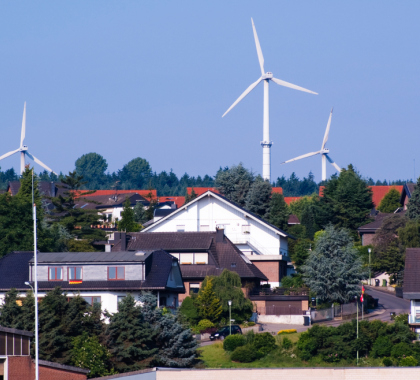Concerned military effectiveness and readiness at their states’ large military bases are being compromised by the growing numbers of wind turbines erected nearby, North Carolina and Texas have taken steps to rein in wind farm development near military installations.
On June 8, Texas Gov. Greg Abbott signed SB 277, a bill eliminating tax exemptions property owners could previously claim if they allowed wind farms to be erected on land within 30 miles of the borders of a military installation. In her formal statement of intent, the Senate sponsor of the bill, state Sen. Donna Campbell (R-New Braunfels) wrote the bill “protects the long-term viability of Texas bases to carry out their missions by prohibiting Chapter 313 tax subsidies and abatements for wind energy projects within 30 nautical miles of the boundaries of military aviation.”
“Military experts have noted that encroaching wind farms around military bases can create adverse conditions that impede operations and create safety risks for pilots and related personnel,” said Campbell’s statement of intent. “Because of their enormous size, wind turbines can also cause interference with radar systems. Moreover, the height and location also affect the altitude of flights and the abilities for training missions to meet their flight goals.”
No Loss of Property Rights
Critics of SB 277 said it violates the rights of property owners who want wind energy development on their land. Carine Martinez-Gouhier, a research analyst with the Texas Public Policy Foundation who testified in favor of SB 277, says the bill does not violate property rights.
“This is not a property rights issue,” Martinez-Gouhier said. “Wind energy businesses lost a preferential tax treatment, not the possibility to locate around military bases. In fact, tax abatements represented a perverse incentive to locate, at taxpayers’ expense, in areas that present risks.
“Wind energy subsidies have disrupted Texas’ electricity market and cost Texas consumers billions of dollars,” said Martinez-Gouhier. “The loss of local tax abatements around military bases is a small victory that will help limit future disruptions and costs.”
North Carolina Wind Moratorium
Having received no response to a request the federal government step in to halt operation of Amazon Wind Farm East in northeastern North Carolina, the state’s legislature passed a bill placing an 18 month moratorium on the construction of new wind farms.
In an undated letter in early 2017, several high-level state lawmakers, including Senate Majority Leader Harry Brown (R-Jacksonville), Senate Deputy President Pro Tempore Louis Pate (R-Mount Olive), and Speaker of the House Tim Moore (R-Kings Mountain), sent a letter to then-Homeland Security Secretary (now White House Chief of Staff) John Kelly asking Homeland Security to halt the operations of Amazon Wind Farm U.S. East, saying the facility will interfere with a nearby state-of-the-art radar facility operated by the Pentagon.
Not waiting for a response from Homeland Security, the legislature imposed the 18=month moratorium on new wind developments as part of a larger energy bill. Gov. Roy Cooper signed the bill, which also contained expanded mandates for solar energy he desired. The moratorium does not affect Amazon Wind Farm East, which is already in operation.
Solar Compromise
Only California has installed more solar capacity than North Carolina, and Cooper had said he wanted to encourage further solar production. Duke Energy, the state’s largest utility, opposed expansion, arguing a glut of installations in the eastern part of the state was driving up consumers’ bills.
In a compromise, Duke will double its solar capacity, adding 2.6 gigawatts of new solar power in the next three and a half years, while the bill reduces the relatively generous subsidies for solar installations in the state (thus cutting incentives for people to sell solar power to Duke), reduces the size of projects eligible for a guaranteed offer of purchase from five megawatts to one megawatt, and sets up a competitive bidding process allowing Duke Energy to select the solar projects that best meet its supply and demand needs.
Cooper said he was not happy with the wind moratorium.
“This bill is critical for the future of significant increases in our already booming solar industry,” Cooper said in a statement. “I strongly oppose the ugly, last-minute, politically motivated wind moratorium.
“However, this fragile and hard-fought solar deal will be lost if I veto this legislation and that veto is sustained,” said Cooper’s statement. “As I signed the bill into law today, I also signed Executive Order No. 11 that will mitigate the effects of the moratorium.”
Cooper’s executive order directs state agencies to continue processing applications for new developments during the 18-month moratorium, even though no new wind farms can be approved or construction begun.
‘Real and Serious’ Conflicts
John Droz, founder of the Alliance for Wise Energy Decisions, said North Carolina’s legislature was right to be concerned about the effect of wind farms on national security.
“The more I see and hear about the wind energy military issue, the more concerned I am that most of our local, state, and federal representatives do not really understand the problem, and as a result they are not doing what actually needs to be done to alleviate this conflict,” Droz said. “The powerful wind lobby is relentlessly working to take full advantage of these weaknesses and misunderstandings.
“The conflicts between wind developments and military operations are real and serious,” said Droz. “It’s a credit to North Carolina legislators they passed H589, which includes a two-year [backdated to the beginning of 2017] statewide wind energy moratorium giving them time to conduct a detailed study on this matter, enabling legislators to better understand the effects of wind farms on military readiness.”
H. Sterling Burnett, Ph.D. ([email protected]) is a research fellow at The Heartland Institute.
Official Connections:
Texas state Sen. Donna Campbell (R-New Braunfels): http://www.donnacampbell.com/; [email protected]





